Charging an electric vehicle in public can range in price from free to very expensive. When we recently charged a new 2022 Chevrolet Bolt at an EVgo DC fast charger (DCFC) in Bedford, NH, we discover the pricey end of the spectrum can be more than it would cost to fuel a "gas-guzzling" V8-powered muscle car.
Related Stories:
Big Mistakes To Avoid When Charging an EV In Public
Many Public DC Fast Chargers For Electric Vehicles Are Slower Than You’d Think
Quick Stops At Level 2 Public Electric Vehicle Chargers Are Worthless
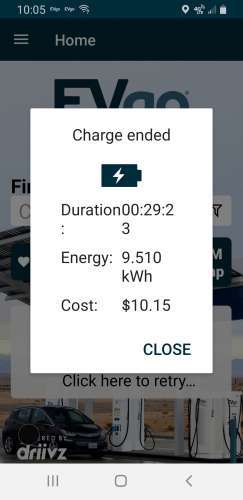
$10.15 To Add 34 Miles of EV Range
We charged up a Chevy Bolt using the EVgo DC fast charger, and the bill was $10.15. That amount of money added 34 miles of range to the Bolt. So, the cost per mile of energy was 30 cents per mile. Let’s compare that to a 2021 Dodge performance car we tested the prior week.
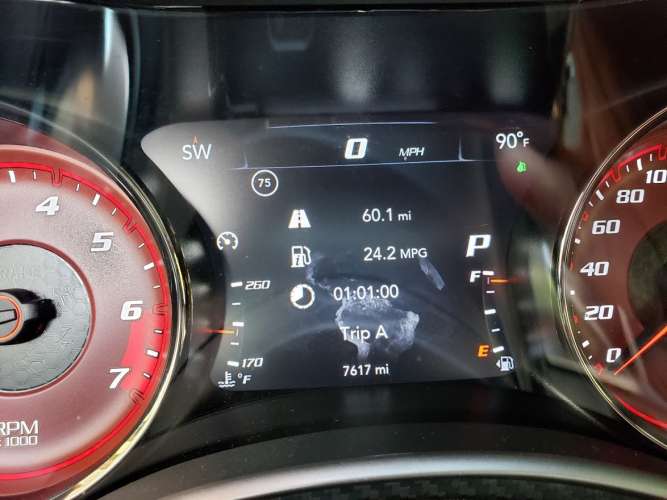
The Dodge had 797 hp, and it returned a combined fuel mileage of 24 MPG in our use on the same route we tested the Bolt. We paid $2.90 per gallon for the gasoline it uses. Doing some “goes in’tahs,” the cost per mile for energy in the muscle car turns out to be 12 cents. Thus, the cost per mile to energize the Bolt was roughly triple what the V8 gas-powered car cost us.
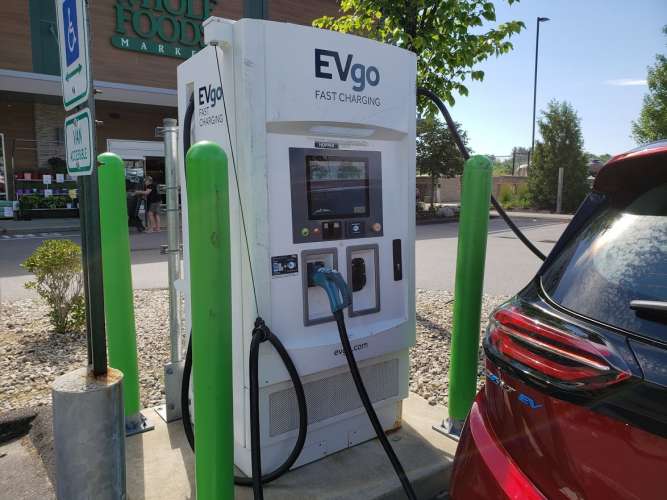
Charging Etiquette
When charging in public one is supposed to quit charging when one’s EV reaches 80% state of charge. The reasons for this are two-fold. First, the rate at which charge can be added to an EV battery is more rapid below 80% and much more time-consuming as the battery reaches full. Second, EV chargers are in very short supply. We need to ration them.
On my route from the metro Boston area to the lakes region of New Hampshire, there are exactly zero public DC fast chargers. In order to charge at a DCFC, I took a slightly longer by time route to swing by one of only two DCFC charging spots in that area. Google “Henniker NH DC Fast Chargers” if you want to see what I mean about no chargers. I needed to top-off in order to complete the 200+-mile route I was making. So, I broke charger etiquette, and I charged to full.
I also charged at the DCFC because I wanted to test my EVgo membership RFID card and account and see how long the DCFC took to add back miles. Both were successful tests.
Charging For Free
Coincidental to my test, GM was running a free-to-charge promotion day during the week I had the Bolt. I think free anything is great, but I always wonder, what’s the hidden agenda? If charging up an EV is very affordable anyway, why does there need to be a promotion to make it “free?” If Dodge offered free gas to muscle car owners, I suppose folks would jump at the chance for a free fillup. But why make EV charging free?
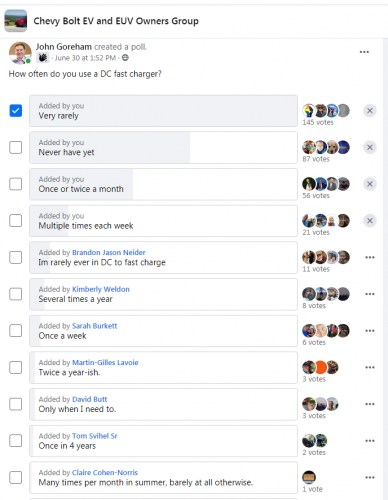
The answer is to get EV owners to the chargers and have them try out the experience. You see, when we poll owners of EVs, most report that they only charge at home, and almost none report using DC fast chargers.
When I plugged into the EVgo DC fast charger, I hadn’t thought about the cost. After all, we constantly hear how affordable EVs are to power up. I have done the math at my own home, and I know that the cost is typically about five to seven cents per mile of range I add back on my home charger using my relatively pricey Boston-area electricity. $10.15 for just 34 miles was a “shock.” Get it, shock. Bet you never heard that in an EV story before.
Related Story: New Hampshire Innkeepers Demonstrate EV-Driving Guest Best Practices
Feel free to tell us in the comments below what you typically pay to charge in public at a DC fast charger and how that cost compares to your cost at home.
John Goreham is a long-time New England Motor Press Association member and recovering engineer. John's interest in EVs goes back to 1990 when he designed the thermal control system for an EV battery as part of an academic team. After earning his mechanical engineering degree, John completed a marketing program at Northeastern University and worked with automotive component manufacturers, in the semiconductor industry, and in biotech. In addition to Torque News, John's work has appeared in print in dozens of American newspapers and he provides reviews to many vehicle shopping sites. You can follow John on TikTok @ToknCars, on Twitter, and view his credentials at Linkedin
Set as google preferred source


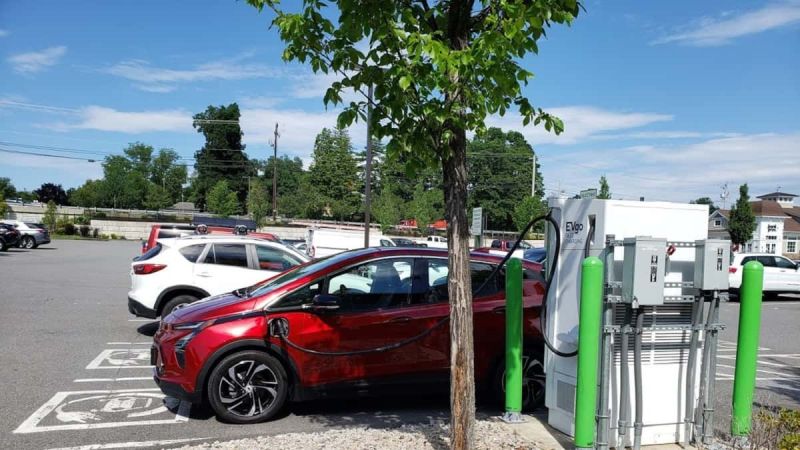




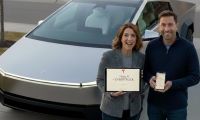

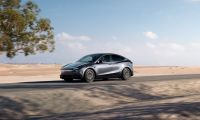
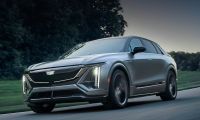

Comments
This whole charge to 80% is
Permalink
This whole charge to 80% is ridiculous. Why dont they redefine 80% as full and give that amount of battery enough range to do what needs doing?
If you plug Henniker,NH into
Permalink
If you plug Henniker,NH into the PlugShare app you will find dozens of DC fast chargers and hundreds of L2 chargers within 50 miles. You clearly demonstrated why it is a well known common practice to avoid charging to 100%. 80-100% takes as long as 20-80%. You could have made two short stops rather than on long stop and have saved yourself time and money. At 90% you were pulling ~10kW. You should have opted for one of the dozens of nearby L2 stations which were just as fast but way cheaper. You are correct that we need mofe DC fast chargers and that they should charge by the kWh of energy dispensed, not by time connected.
Michael, maybe I'm different
Permalink
In reply to If you plug Henniker,NH into by Michael (not verified)
Michael, maybe I'm different from other EV drivers. I'll come off the highway or my chosen route and drive a few miles to charge. Using the DCFC cost me about 15 minutes, not including the charge time. Two things I won't do is drive out of my way to charge or spend an hour or more killing time to add back part of my car's range. The last L2 public charger I visited (ChargePoint) added 7 miles in 20 minutes to a Mustang Mach-E. I'm not strictly a "time is money" kind of guy, but the reason I go to NH is to avoid the city. Driving into one to recharge is not really logical for me for this trip. Around Metro Boston, things are different, and I can charge at home anyway. I think the best solution is to hope that some company copies Tesla. There are a dozen Supercharger spots on my route both going and coming from my area of interest. I've never seen them all full. Though in Metro Boston it is common for all the SC spaces to be taken up during peak hours. Look closely at the list of DCFCs in NH and you may find many of them are actually Tesla Superchargers, which are not "public."
I have a leaf, Outlander
Permalink
I have a leaf, Outlander phev, and model S. I've used evgo half a dozen times over 2+years. Fast chargers cost too much from evgo. I'm in NY and they have a few free dcfc at rest areas (great job NY). Otherwise I only use free level 2 or free Tesla chargers. At home I have 120 and 220 charging options.
This is a very silly article
Permalink
This is a very silly article using Evgo as an example.. most people charge at home and many also use Solar. The fast charge stations are for mostly when you travel beyond the range of your EV. If you're using a 50kw fast charger then in half hour you should get 15kw. This should cost less than 2 dollars and with most EVs you will get a range of 60 miles As with such click bait articles they don't consider the harm such articles do. Factor in the pollution and climate change impact of your fast guzzler and you so see that at any rate of charging an EV is better for the planet. If we factor the subsidy in gasoline it will be over 10 dollars or more per gallon which is why a carbon tax on gasoline is necessary.
Srini, I point out in the
Permalink
In reply to This is a very silly article by Srini (not verified)
Srini, I point out in the story that the majority of EV drivers (myself included) primarily charge at home. I also made sure to mention that most people who drive EVs don't use EVgo DCFCs. I even did a poll and inserted a screenshot of the results to drive that point home. How much farther could I go to clarify that this example is the expensive end of the cost curve?
The article proves a point,
Permalink
The article proves a point, but the wrong way. Yes.... DC charger are very expensive comparitively....the somewhat dirty secret of EVs. I charge with solar at home, I charge free at work. But the DC chargers near me are anywhere from 30 to 50 cents per kWh.... But there is 33kwh in a gallon of gas... So at those prices I am paying $10-$17 PER GALLON equivalent in energy. That pretty much negates the 75-95mpg equivalent I get ony EV compared to a 25-35mpg sedan. If I charged at the average 10 cent/kWh in my area.. I would be paying about $3.30 for a gallon... Equal to gasoline. I have an EV but know I am better off taking my petrol vehicle on longer trips because of the price difference at 30-40 cents/kwh doesn't save me much and I save time not charging up. I want EV's to work....and the chargers aren't making much, but electricity at 6-10 cents wholesale becomes 30-40 cents and negates the efficiency increases. We need the economics to work.
Cost per mile is not a good
Permalink
Cost per mile is not a good comparison. Each vehicle is different as the author demonstrated with the Dodge Challenger. As many other commenters have suggested cost per kW-hr (which everyone can relate to if they have ever looked at their electric bill) is the correct metric. My Ford Fusion does 29 miles per charge which has a storage capacity of 9 kW-hr. Many charging stations charge by the hour, not by how much energy (kW-hr) is added to your batteries.
Since I charge at 3.6 kW, the price at my work location is just over $0.38/kW-hr. If I had a Mitsubishi Outlander, or fully electric vehicle , I could charge at 8 kW, and my price would drop to $0.173 / kW-hr.
Which is less expensive than charging at home ($0.45/kW-hr and will be increasing next month). Locally gasoline is $4.50 per gallon reg unleaded. $0.38/kW-hr is equivalent to $5.50 gasoline and $0.45/kW-hr is equivalent to $6.50 per gallon gasoline. Your EVgo charger was equivalent to $15.50 gallon of gasoline.
PS, when rates are quoted nationalky, high rate locations typically do not include their transmission fees / kW-hr (sometimes >$0.18/kW-hr.) Or they only quote their lowest tier, e.g SoCal Edison.
My Tesla can not use those
Permalink
My Tesla can not use those chargers. Maybe that is why Tesla made their own chargers to keep us from getting ripped and pay way less than polluter vehicles. However it is time to stop polluting. We have the tech for all vehicles to be EV. Also caty converter theft would be no more
Terry, when I signed up for
Permalink
In reply to My Tesla can not use those by Terry (not verified)
Terry, when I signed up for EVgo I noticed that the brand does now offer Tesla connectors at its newer installations, and in older locations an adapter can be used with the CHAdeMO EVgo handle. Hope this expands your emergency options. More here: https://www.evgo.com/tesla/
Definitely the exception here
Permalink
Definitely the exception here.
30 minutes to add 34 miles on
Permalink
30 minutes to add 34 miles on a DC fast charger.... Yikes. So glad I got a Tesla.
One underlining item that get
Permalink
One underlining item that get forgotten is once there is critical number of EV on the road, that experience may happen more frequently. Cheap fast recharge on the road won't be forever.
There was a time when ATM transaction, including withdrawal, were all free too. Once people stopped going inside that became a money maker for bank.
Telsa and other charging location will not be free forever either, at one point that will be a revenue stream too
Well said, Zach. FYI, Tesla
Permalink
In reply to One underlining item that get by Zak (not verified)
Well said, Zach. FYI, Tesla stopped providing free supercharging to its customers buying new vehicles in November of 2016.
Tesla is moving fast to
Permalink
In reply to One underlining item that get by Zak (not verified)
Tesla is moving fast to reduce charging cost. Currently solar is among the least expensive form of energy to add to the grid.
There are articles explaining this in detail. You just need to read them.
I charged my 2020 Nissan leaf
Permalink
I charged my 2020 Nissan leaf at a charge Plus the other day in Stockton California and they charged a $10 parking fee plus .36 cents a minute.
Talk like that will get you
Permalink
In reply to I charged my 2020 Nissan leaf by Stacey L Nelson (not verified)
Talk like that will get you labeled a conspirator, Stacey ;)
That's very much on the super
Permalink
That's very much on the super high end and is a little misleading. Driving across country, I pay about the same as I would as a car getting 40mpg (might be better with rising gas prices)
But as the article said, I charge 99% at home where I get about 100 miles for $1.40
- Cars charge slower from 80%
Permalink
- Cars charge slower from 80% to full to preserve the battery
- The charger in question bills per minute. Other companies sometimes do per kWh.
- You can get a 50 kWh rate on that car under 80%. You got about a 20 kWh rate here.
- EvGO has some chargers that reach 200 kWh or more which brings the per-kWh cost under 15 cents in some cases. This is great for Teslas. Any per-kWh cost under 30 is probably better than gas so yes, these 50 kWh chargers are probably at least 15% more expensive than they should be even in the most optimal conditions. They shouldn’t be any more than 25 cents a minute, preferrably 20 to be competitive.
I drove from ottawa to
Permalink
I drove from ottawa to Halifax and back on the Tesla network it cost me $50 would have cost me $100 if I had not had free referral miles. My wife has a Kia Soul and we have had similar “expensive” charging experiences. When I use to drive gas cars you would hit expensive gas stations in remote areas that were 20 or 25 cents more than typical gas stations in your area. If you live in an apartment and 100% of your charging is public EV go type charging then one of the big benefits of EV ownerships is lost for you. What I ask people is how often do you fill up 2 times in a day. It’s only on a road trip and for most of us even in non covid times that’s 2 or 3 times a year. If 90 % of your driving is around your city then any EV will be great. If your local driving is a lot less than your road trip driving then you need a Tesla. Tesla is the only ev company that has affordable road trip driving.
Craig, I mostly agree. Indeed
Permalink
In reply to I drove from ottawa to by Craig Sweetnam (not verified)
Craig, I mostly agree. Indeed Tesla has Superchargers on this route perfectly placed, and they are on both the North and Southbound side of the highway. I consider PHEVs like the RAV4 Prime EVs, and they can make this trip without breaking a sweat. If you live in an apartment, why not a 50 MPG hybrid, or a 133 MPGe PHEV? Why live for the car's needs and not your own?
I drove a hybrid for 5 years
Permalink
In reply to Craig, I mostly agree. Indeed by John Goreham
I drove a hybrid for 5 years before buying a Tesla I would never buy a hybrid again! You have the worst of all worlds for very little benefit. I would agree with you if your someone who hates tesla and or Elon Musk and refuse to buy a Tesla on principal then maybe a hybrid is an ok option if you do a lot of trip driving vs local driving.
Why I hate hybrids
A) room you have to have both gas and electric systems so for the same size car you have a lot more room devoted to car operations vs personal storage. my ford fusion hybrid was virtually the same size as my tesla model 3 but for useable storage for groceries and suitcases etc it has 4 times the storage space. The frunck of the model 3 has almost as much storage as my 2013 Ford Fusion had in the entire trunk. My hybrid was old enough that I could not plug it in at all so my cost per KM was still at least double that of my model 3. I also had to pay for oil changes and the other service that I have spent nothing on for my Model 3. I am well over 10,000 KM and I have bought a new pair of wipers for the model 3 because I always want the gold standard wipers for my car but I went through wipers often on my Ford. I feel like the dealership is practically stealing from my wife by charging her almost $300 a year for "annual" service on her Kia Soul EV. I spent nearly that a quarter on my Hybrid for oil changes.
my hybrid went to the dump after me after only 5 years because the transmission was going and who wants to pay 5K for a new transmission on a 250,000 KM ford fusion. even with really bad battery degradation on a Tesla you will get enough range to make the car drivable in a city even after 10 years of use so a tesla should last a lot longer than my Ford hybrid did. With Hybrids you have everything to go wrong in both systems so your likelihood of needing service is increased.
in conclusion my hybrid was great when I bout it in late 2012 it was less than half the cost of a model S that was really the only fully electric car available in late 2012. but compared to today's car line up you must have a reallllly compelling reason to not want to buy a Tesla and want to ignore Total cost of ownership to buy a hybrid today.
Thanks for your comment,
Permalink
In reply to I drove a hybrid for 5 years by Craig Sweetnam (not verified)
Thanks for your comment, Craig. In fairness to hybrids, yours was a 2013. And a Ford. Which 2013 Tesla BEV sedan of the same price was comparable to that Ford you owned? Do you think that owners of Toyota hybrids feel like the cars provide a bad bang for the buck? If so, why do Prius cars dominate rideshare (Google it)? The Prius hybrid has an unbroken record of perfect 5/5 Consumer Reports reliability scores from 2009 through 2021. Name any vehicle that can match that reliability. Model 3 cars are fantastic. There is no denying it. However, the ATP (average transaction price) is in the $50ks and the ATP (average transaction price) for Prius, Corolla, and Camry hybrid cars in the high $20K to low $30ks. And congrats on getting a quarter million kilometers on your Ford hybrid before you had a major problem. That is 155,000 miles for those who don't have the conversion handy. Finally, Toyota includes 2 years of maintenance in the US market. That sure helps with the 5-year COO calculations. Particularly on 24 or 36-month leases for those who use the cars in businesses.
Given weather catastrophes
Permalink
In reply to Craig, I mostly agree. Indeed by John Goreham
Given weather catastrophes occurring all around you due to carbon emissions your comment is just sadly head in the sand.
Let's say that charge took 30
Permalink
Let's say that charge took 30 mins and gave 10 kWh: that's an average charge rate of 20 kW. For a DC charger that's almost a trickle. My EV routinely charges at >150 kW, and anything below 40 kW I always unplug.
Why would anyone use a DC fast charger to charge at such slow rates, probably getting billed by the minute, unless it was to try to make EVs look bad? Oh... to try to make EVs look bad to those who don't know any better (the muscle car comparison kinda emphasizes it too!).
Orac, great insight. Here are
Permalink
In reply to Let's say that charge took 30 by Orac (not verified)
Orac, great insight. Here are a couple more "Or ifs" Or if an EV owner wanted to ensure their EVgo account and RFID card were working before they needed it. Or if the EV driver was headed on a trip into a rural area and this was the last DCFC, or charging option of any type, on that journey.
Yes. Extreme edge-cases, not
Permalink
In reply to Orac, great insight. Here are by John Goreham
Yes. Extreme edge-cases, not worthy of using as a comparison to operating costs of a gasoline car.
Can you do the math based on
Permalink
Can you do the math based on $7.60/gallon Cdn. That's our gas price today here on Vancouver Island:) so, EV or Hybrid might be better for us.
Like you said. Most people
Permalink
Like you said. Most people charge at home and where I live, it's extremely cheap compared to a gas vehicle. My son recently was in Calgary, AB for a trip with the Tesla. He topped up from near dead at a Tesla charging station - $12 Canadian. So I think your situation is completely untrue for most EV owners.
While the title is actually
Permalink
While the title is actually true, this is a somewhat rare situation. Even when you do a DC fast charge session at a public station, most of the time you will be paying around $0.10 to $0.20 per mile of range. And on a gas gluzzer you would need to take in account also the cost of oil and regular maintenance. On a car whose oil change is $50 every 5000 miles, it is already $0.01 per mile. On a performance car that uses snake oil for $300 every 3000 miles, that alone is $0.10 per mile.
Pagination